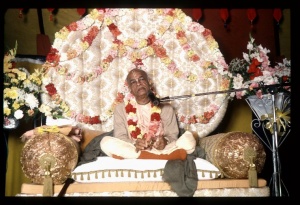SB 4.18.3: Difference between revisions
No edit summary |
Visnu Murti (talk | contribs) No edit summary |
||
| Line 5: | Line 5: | ||
[[Category:Srimad-Bhagavatam - Canto 04 Chapter 18|s03]] | [[Category:Srimad-Bhagavatam - Canto 04 Chapter 18|s03]] | ||
[[Category:Bhagavatam Verses Spoken by Mother Earth in the form of a cow - Vanisource|041803]] | [[Category:Bhagavatam Verses Spoken by Mother Earth in the form of a cow - Vanisource|041803]] | ||
[[Category:Bhagavatam Verses Spoken by Mother Earth - Vanisource|041803]] | |||
<div style="float:left">'''[[Srimad-Bhagavatam]] - [[SB 4|Fourth Canto]] - [[SB 4.18: Prthu Maharaja Milks the Earth Planet|Chapter 18: Pṛthu Mahārāja Milks the Earth Planet]]'''</div> | <div style="float:left">'''[[Srimad-Bhagavatam]] - [[SB 4|Fourth Canto]] - [[SB 4.18: Prthu Maharaja Milks the Earth Planet|Chapter 18: Pṛthu Mahārāja Milks the Earth Planet]]'''</div> | ||
<div style="float:right">[[File:Go-previous.png|link=SB 4.18.2]] '''[[SB 4.18.2]] - [[SB 4.18.4]]''' [[File:Go-next.png|link=SB 4.18.4]]</div> | <div style="float:right">[[File:Go-previous.png|link=SB 4.18.2]] '''[[SB 4.18.2]] - [[SB 4.18.4]]''' [[File:Go-next.png|link=SB 4.18.4]]</div> | ||
Revision as of 06:10, 4 December 2023

A.C. Bhaktivedanta Swami Prabhupada
TEXT 3
- asmiḻ loke 'thavāmuṣmin
- munibhis tattva-darśibhiḥ
- dṛṣṭā yogāḥ prayuktāś ca
- puṁsāṁ śreyaḥ-prasiddhaye
SYNONYMS
asmin—in this; loke—duration of life; atha vā—or; amuṣmin—in the next life; munibhiḥ—by the great sages; tattva—the truth; darśibhiḥ—by those who have seen it; dṛṣṭāḥ—prescribed; yogāḥ—methods; prayuktāḥ—applied; ca—also; puṁsām—of the people in general; śreyaḥ—benefit; prasiddhaye—in the matter of obtaining.
TRANSLATION
To benefit all human society, not only in this life but in the next, the great seers and sages have prescribed various methods conducive to the prosperity of the people in general.
PURPORT
Vedic civilization takes advantage of the perfect knowledge presented in the Vedas and presented by great sages and brāhmaṇas for the benefit of human society. Vedic injunctions are known as śruti, and the additional supplementary presentations of these principles, as given by the great sages, are known as smṛti. They follow the principles of Vedic instruction. Human society should take advantage of the instructions from both śruti and smṛti. If one wants to advance in spiritual life, he must take these instructions and follow the principles. In Bhakti-rasāmṛta-sindhu, Śrīla Rūpa Gosvāmī says that if one poses himself as advanced in spiritual life but does not refer to the śrutis and smṛtis he is simply a disturbance in society. One should follow the principles laid down in śrutis and smṛtis not only in one's spiritual life but in material life as well. As far as human society is concerned, it should follow the Manu-smṛti as well, for these laws are given by Manu, the father of mankind.
In the Manu-smṛti it is stated that a woman should not be given independence, but should be given protection by her father, husband and elderly sons. In all circumstances a woman should remain dependent upon some guardian. Presently women are given full independence like men, but actually we can see that such independent women are no happier than those women who are placed under guardians. If people follow the injunctions given by the great sages, śrutis and smṛtis, they can actually be happy in both this life and the next. Unfortunately rascals are manufacturing so many ways and means to be happy. Everyone is inventing so many methods. Consequently human society has lost the standard ways of life, both materially and spiritually, and as a result people are bewildered, and there is no peace or happiness in the world. Although they are trying to solve the problems of human society in the United Nations, they are still baffled. Because they do not follow the liberated instructions of the Vedas, they are unhappy.
Two significant words used in this verse are asmin and amuṣmin. Asmin means "in this life," and amuṣmin means "in the next life." Unfortunately in this age, even exalted professors and learned men believe that there is no next life and that everything is finished in this life. Since they are rascals and fools, what advice can they give? Still they are passing as learned scholars and professors. In this verse the word amuṣmin is very explicit. It is the duty of everyone to mold his life in such a way that he will have a profitable next life. Just as a boy is educated in order to become happy later, one should be educated in this life in order to attain an eternal and prosperous life after death. It is therefore essential that people follow what is given in the śrutis and smṛtis to make sure that the human mission is successful.